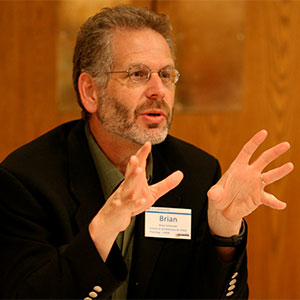Bio
Brian Schermer, Ph.D. is a licensed architect and associate professor of architecture at the University of Wisconsin-Milwaukee. He is also a principal at Workshop Architects, a nationally known firm that specializes in the design of student life facilities for higher education. His research and creative practice focus on understanding the college campus as a social ecology and the planning and design of campus places that foster community, learning, work-life balance, and sense of belonging. His research on campus capital mapping received the 2017 Certificate of Research Excellence from the Environmental Design Research Association. He is a co-recipient of the 2018 Certificate of Research Excellence from the Environmental Design Research Association for research on the architecture of social learning and knowing: creating change in the workplace. He is a regular presenter at academic conferences, conferences for higher education professionals, and is a participant in the Association of College Unions International’s national study of college unions as places for student engagement for learning. He is the co-author of two books, Law and Practice for Architects and Building Bridges, Blurring Boundaries: The Milwaukee School of Environment-Behavior Studies. His teaching received the 2011 National Architectural Registration Boards award for Creative Integration in Practice and the Academy.
Education
Ph.D. in Architecture, University of Michigan
M. Arch., University of Wisconsin-Milwaukee
B.A., University of Wisconsin-Madison
Research Focus
Architectural clients and the relationship between organizational and architectural change
Challenges in contemporary architectural practice
Courses
Arch 585 Research Methods
Arch 586 Programming for Arch Design
Arch 645/845 Workshop Studio
Arch 750 Pro-seminar in Environmental Design Research
Arch 785 Advanced Research Methods in Architecture
Selected Work
"Lost in the Translation: Project Partnering as a Model of Collaborative Design and Construction." Association of Collegiate Schools of Architecture International Conference; Helsinki, Finland; July 27-30, 2003.
"Weaving the Institutional and the Practical in Everyday Architectural Ethics." Association of Collegiate Schools of Architecture Central Region Conference; Muncie, Indiana, October 24-26, 2003.
"Organization Clients and Architectural Communities of Practice: Material and Social Construction at the Chrysler Technology Center." Ph.D. Dissertation, University of Michigan, 2002
"Post-Occupancy Evaluation and Organizational Learning," in Community: Evolution or revolution: Proceedings of the 33rd Annual Conference of the Environmental design Research Association in Philadelphia, Pennsylvania, May 22-6, 2002.
"Client-Situated Architectural Practice: Implications for Architectural Education," Journal of Architectural Education, September 2001, 31-42
"Post-Occupancy Evaluation & Organizational Development: the Experience of the United States Postal Service." Co-author with Jay Farbstein, Min Kantrowitz, and John Hughes-Caley, Building Evaluation: Advances in Methods and Applications, Wolfgang F. E. Preiser (Ed.) New York: Plenum; 1989
